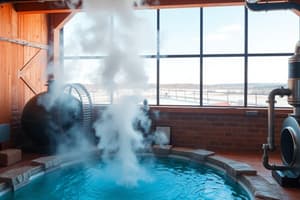Podcast
Questions and Answers
Nguồn năng lượng nào được tạo ra từ các nguồn tài nguyên tự nhiên có thể được bổ sung lại theo thời gian?
Nguồn năng lượng nào được tạo ra từ các nguồn tài nguyên tự nhiên có thể được bổ sung lại theo thời gian?
- Fossil Fuels
- Năng lượng tái tạo (correct)
- Thermodynamics
- Nuclear energy
Ưu điểm nào của năng lượng tái tạo?
Ưu điểm nào của năng lượng tái tạo?
- Tăng lượng khí thải nhà kính
- Bền vững và tái tạo (correct)
- Chi phí ban đầu thấp
- Nguy cơ an toàn cao
Mục đích của hiệu quả năng lượng là gì?
Mục đích của hiệu quả năng lượng là gì?
- Sử dụng ít năng lượng hơn để đạt được cùng một kết quả (correct)
- Tăng cường sử dụng năng lượng hạt nhân
- Tiêu thụ nhiều năng lượng hơn
- Giảm chi phí vận hành
Nguồn năng lượng nào có đặc điểm là không phát thải khí thải nhà kính trong quá trình vận hành?
Nguồn năng lượng nào có đặc điểm là không phát thải khí thải nhà kính trong quá trình vận hành?
Nguồn năng lượng nào được tạo ra từ các quá trình phân rã hạt nhân?
Nguồn năng lượng nào được tạo ra từ các quá trình phân rã hạt nhân?
Môn học nào nghiên cứu về nhiệt, nhiệt độ và sự truyền năng lượng?
Môn học nào nghiên cứu về nhiệt, nhiệt độ và sự truyền năng lượng?
What is the main characteristic of renewable energy?
What is the main characteristic of renewable energy?
What is the process of generating nuclear energy?
What is the process of generating nuclear energy?
What is the main benefit of improving energy efficiency?
What is the main benefit of improving energy efficiency?
What are the disadvantages of fossil fuels?
What are the disadvantages of fossil fuels?
What is the first law of thermodynamics?
What is the first law of thermodynamics?
Which type of energy is generated from ancient plants and animals?
Which type of energy is generated from ancient plants and animals?
Flashcards are hidden until you start studying
Study Notes
Renewable Energy
- Energy generated from natural resources that can be replenished over time
- Examples:
- Solar energy (photovoltaic, solar thermal)
- Wind energy (wind turbines)
- Hydro energy (hydroelectric power plants)
- Geothermal energy (heat from Earth's interior)
- Biomass energy (organic matter)
- Advantages:
- Sustainable and renewable
- Low operating costs
- Reduces greenhouse gas emissions
- Challenges:
- Intermittent power supply
- High upfront costs
- Land requirements
Energy Efficiency
- Using less energy to achieve the same outcome
- Improving energy productivity through technology and design
- Examples:
- Energy-efficient lighting (LEDs)
- Insulation and building materials
- Energy-efficient appliances
- Smart grids and smart buildings
- Benefits:
- Reduces energy consumption
- Saves costs
- Decreases greenhouse gas emissions
Nuclear Energy
- Energy generated from the nucleus of an atom
- Through nuclear fission or fusion reactions
- Examples:
- Nuclear power plants (fission)
- Experimental fusion reactors
- Advantages:
- Zero greenhouse gas emissions during operation
- High energy density
- Reliability
- Challenges:
- Nuclear waste disposal
- High upfront costs
- Safety concerns
Fossil Fuels
- Energy generated from ancient plants and animals
- Examples:
- Coal
- Oil
- Natural Gas
- Advantages:
- High energy density
- Well-established infrastructure
- Relatively low costs
- Challenges:
- Finite resources
- Greenhouse gas emissions
- Environmental impacts (extraction, transportation, combustion)
Thermodynamics
- Study of heat, temperature, and energy transfer
- Laws of Thermodynamics:
- Energy cannot be created or destroyed, only converted
- Total entropy (disorder) always increases in a closed system
- Absolute zero is unreachable
- Key concepts:
- Energy conversion (e.g., mechanical to thermal)
- Efficiency (energy output vs. input)
- Heat transfer (conduction, convection, radiation)
- Systems and boundaries (open, closed, isolated)
Studying That Suits You
Use AI to generate personalized quizzes and flashcards to suit your learning preferences.





